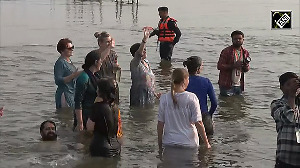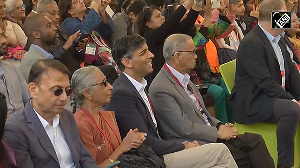I was in Kathmandu recently attending a meeting with a group of eminent Pakistanis. We met to analyse the costs of the India-Pakistan confrontation last year and to discuss ways in which we could move ahead on the initiative announced by Prime Minister Vajpayee in Srinagar.
Apart from relaxing in the cool climate of Kathmandu, I also enjoyed meeting Pakistani friends whom I knew rather well earlier, like former foreign minister Sartaj Aziz, General Musharraf's confidante and Interior Minister General Moinuddin Haider, former minister of state Inam-ul-Haq and Track II specialist Niaz Naik. There were also others I knew personally like Brigadier Shaukat Qadir and the young strategic analyst Ayesha Agha Siddiqui. Our exchanges in Kathmandu were interesting, cordial and remarkably candid.
Even as we were exchanging views on how to normalise relations, Nepalese newspapers reported that General Musharraf had refused to rule out the possibility of yet another Kargil style intrusion. We ignored what General Musharraf had said and continued with our exchanges to find common ground for normalising relations.
I was not surprised by General Musharraf's comments where he justified the Kargil intrusion, threatened the possibility of it being repeated, rubbished Prime Minister Vajpayee's Lahore Bus Diplomacy, declared the recent elections in Jammu and Kashmir as fraudulent and claimed that his 'referendum' reflected overwhelming endorsement of his rule by the people of Pakistan.
We tend to forget that General Musharraf who authored the Kargil misadventure, told a Karachi audience just a few weeks after Vajpayee's Lahore bus ride that the Lahore Declaration was nothing but 'hot air' and that 'low intensity conflict with India would continue even if the Kashmir issue is resolved.'
General Musharraf contested the television anchor's assertion that by denying that he had supported the Taliban and engineered the Kargil intrusion he was getting into a 'denial' mode. Being in a denial mode is not something new for General Musharraf. He did, after all, refuse to accept the bodies of his slain soldiers of the Northern Light Infantry during the Kargil conflict, merely because accepting the bodies of his soldiers would have exposed his 'denial' about his soldiers being involved in the intrusion as a lie.
Even as General Musharraf was launching his diatribe against India, Deputy Prime Minister L K Advani remarked in Chicago during the course of a successful and high profile visit to the United States: 'There can be a compromise on Jammu and Kashmir. We have to see what kind of compromises are possible even now.'
While Advani's comments will be welcomed internationally, we should ponder over what they would convey to a hard-boiled and pathologically anti-Indian ruler like General Musharraf, who regards all talk of compromise as manifestations of Indian weakness.
The discussions in Kathmandu gave some interesting insights into Pakistani thinking. There is a growing feeling in Pakistan that India attempted to coerce Pakistan by its troop deployment and failed. Sober elements in Pakistan realise that their country had to pay a heavy price and bow to international pressures to end support for cross-border terrorism.
There are others, especially in the military establishment who feel that India lacks both the military capability and the political will to carry out threats that it all too frequently holds out. By issuing such threats we are unfortunately sounding like the boy who cried wolf all too often. There is also an almost unanimous belief in Pakistani minds that the nuclear weapons that they have possessed since 1984 have effectively immobilised India from executing any military responses to their efforts to 'bleed India with a thousand cuts.'
Even within India there
Despite Pakistani involvement in low intensity conflict in Punjab and Jammu and Kashmir for nearly two decades now, our economy has registered higher rates of growth in these years than ever before. Our economic progress is not going to depend on what Pakistan does or does not do, but on our ability to manage our economy better.
There has been some movement in normalising relations with Pakistan after Vajpayee's Srinagar address. Shiv Shankar Menon who has been named as our high commissioner to Pakistan and his counterpart Aziz Ahmed Khan are both capable and sophisticated diplomats. The Lahore-Delhi bus service would soon recommence. This should naturally be followed by resumption of air services and over flights.
India should shed its present inhibitions in promoting people to people contacts. We claim that General Musharraf's hawkish views are at variance with prevailing public opinion in Pakistan. We should accordingly strive to enhance communication links and undertake measures to promote group tourism and ties between parliamentarians, journalists, lawyers, business organisations and even students.
Pakistan seems to be in no mood to grant us reciprocal MFN [Most Favoured Nation] trading rights. Progress on the Iranian pipeline project should be linked to the establishment of normal trade, investment and business ties. We should make it clear that if Pakistan persists in blocking moves for a South Asian Free Trade Area, it would jeopardise the future of SAARC. My Pakistani friends agreed that that there should be an end to hostile propaganda, especially on television and radio.
While we can certainly attempt to do this, it is unlikely that Pakistan will end its hostile propaganda against us. This would not suit the ambitions of its military establishment.
It seems unlikely that General Musharraf will end support for cross-border terrorism unless he is subjected to intense pressure. The United States may privately rap him on the knuckles, but appears unwilling to really squeeze him on this issue. Thus, even as we initiate a process of increasing engagement, if not formal dialogue with Pakistan, there should be no dilution in our insistence that Pakistan should dismantle its infrastructure of terrorism.
Pakistan, for example, can quietly ask those involved in the Bombay bomb blasts and in terrorism in Punjab to proceed to a third country like the United Arab Emirates. This would signal its readiness to end the use of terrorism as an instrument of state policy. We could also suggest that rather than seeking international monitors to check cross-border terrorism, Pakistan should agree to our positioning teams from our intelligence agencies like R&AW, duly equipped with monitoring and transportation facilities in Pakistan-occupied Kashmir, while we grant them reciprocal facilities.
If, as General Musharraf claims he cannot check all infiltration across the Line of Control, our teams positioned across the LoC in PoK can verify such claims. The presence of Pakistani teams on our side of the LoC will enable us to give them evidence of Pakistani nationals having crossed the LoC for participating in General Musharraf's self-proclaimed jihad.
We have just begun a long and difficult journey towards commencing a meaningful dialogue with Pakistan. It would be advisable to move with circumspection and caution on this bumpy road, without blowing the horn loudly, or too often. The road to India-Pakistan normalisation has historically been an accident-prone one.






 © 2025
© 2025